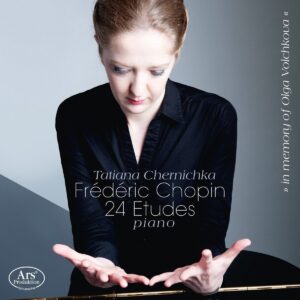Tatiana Chernichka understandably claims her stake in a pedagogic and familial lineage when it comes to the Chopin Etudes. Her late mother Olga Volchkova, a pianist who studied under Heinrich Neuhaus and Yakov Zak at the Moscow Conservatory, was the first to perform the entire cycle in concert in her hometown of Novosibirsk. Then Chernichka became the second person to do so in 2014. Two years later she made this unappealing studio recording as a memorial to her mother.
The first two Op. 10 selections get things off to a fluent and promising start. However, Chernichka’s square and prosaic No. 3 foreshadows what to expect from the other slow and lyrical etudes. No. 4’s melodic shapes fall by the wayside, although the pianist’s galvanic nervous energy impresses. The “Black Key” No. 5 transpires with every note in place, and nothing more, although No. 7’s alternating thirds and sixths convey a modicum of playfulness. Again, No. 8 barely reaches beyond precise fingerwork. Like Horowitz, Chernichka plays this etude’s final four chords softly, as opposed to Chopin’s marked forte–an old school tradition that pianists of a certain generation called a “reverse accent”. No. 10 is admirably varied in regard to articulations, and sensitively nuanced. So are No. 11’s widely spaced chords. Chernichka telegraphs the “Revolutionary” No. 12’s crescendos, but her spirited momentum is palpable.
The Op. 25 No. 1 “Aeolian Harp” etude takes wing at the beginning, but Chernichka soon begins to annoyingly accent every melodic note–well, almost every one of them. No. 2’s scurrying triplets sound like unpunctuated run-on sentences rather than elegant phrases. Both Nos. 3 and 4 start off lightly and incisively, yet get heavier and thicker as they unfold. Chernichka’s cautious double sixths in No. 8 come nowhere near the supple legato of Pollini or Perahia, while the little No. 9 basically depicts a generic butterfly.
The No. 10 “octave” etude’s outer sections feature fine legato work, but the central lyrical episode wanders all over the place. A strong and assured “Winter Wind” No. 11 marks this recording’s high point, while Chernichka pounds out No. 12’s arpeggios, hammering the poor notes rigidly into place. Where’s the fabled “oceanic” sweep? Even Georges Cziffra’s comparably gaunt and notey interpretation conveys infinitely more excitement and fantasy. One must acknowledge the noble intentions of Chernichka’s tribute, together with the fact that she plays certain etudes quite well. However, her overall lack of line and monochrome tendencies ultimately add up to an unsatisfying whole.
































